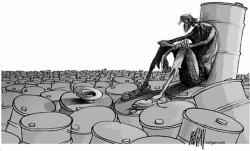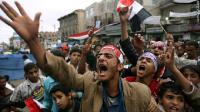 The foundations for the Arab uprisings that took place in the wake of the 2008 financial crisis were laid in the years before by the neoliberal restructuring of Middle Eastern and North African economies.
The foundations for the Arab uprisings that took place in the wake of the 2008 financial crisis were laid in the years before by the neoliberal restructuring of Middle Eastern and North African economies.
Neoliberalism and the Failure of the Arab Spring
Europe
 Seventy years after the end of World War II and the defeat of fascism and Nazism, the extreme right is on the rise in almost every European country.
Seventy years after the end of World War II and the defeat of fascism and Nazism, the extreme right is on the rise in almost every European country.
Putin, the War in Ukraine, and the Far Right
 Putin’s Russia is an imperialist state dominated by a capitalist oligarchy that controls the state and that has developed a bellicose attitude toward its neighbors, whom the oligarchy reproaches for having taken advantage of the collapse of the Soviet Union in order to escape its century-long tutelage.
Putin’s Russia is an imperialist state dominated by a capitalist oligarchy that controls the state and that has developed a bellicose attitude toward its neighbors, whom the oligarchy reproaches for having taken advantage of the collapse of the Soviet Union in order to escape its century-long tutelage.
The Crises of Colonial Capitalism: Video Interview on Puerto Rico's Debt

In this TeleSur interview with Rafael Bernabe, the spokesperson for the Puerto Rican Working Peoples Party advocates for a moratorium on the debt. Bernabe has written an extensive article in the current Summer 2015 issue of New Politics.
The Poverty of Hatred and the Hatred of Poverty: The Ideology of American Progressivism

“Rich people are the fucking worst.” This is the premise and title of Sean Illing’s recent Salon.com article (June 22, 2015). While I agree with his sentiment, the argument that follows this provocative title leaves a lot—too much—to be desired. Illing is a self-professed progressive, and the purpose of his article was to discuss the various “new” ways the rich are expressing disgust for the poor or anyone who isn’t rich, in the context of the on-going drought in California. While I completely agree that “rich people are the fucking worst,” Illing misses the proper target of critique. Rich people do indeed suck. However, progressivism itself sucks, and here’s why: it misses the systemic root problem. The rich suck, because capitalism encourages them to suck.
Puerto Rico’s New Party of the Working People Fights Austerity
 The Partido del Pueblo Trabajador—the Party of the Working People (PPT)—is a political project of the Puerto Rican left addressed to working people in the context of the island’s deep economic crisis.
The Partido del Pueblo Trabajador—the Party of the Working People (PPT)—is a political project of the Puerto Rican left addressed to working people in the context of the island’s deep economic crisis.
On Critical Theory, Value Theory, and So-Called Traditional Marxism
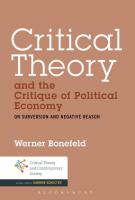 Werner Bonefeld, Critical Theory and the Critique of Political Economy: On Subversion and Negative Reason, New York: Bloomsbury Academic, 2014, 246 pp.
Werner Bonefeld, Critical Theory and the Critique of Political Economy: On Subversion and Negative Reason, New York: Bloomsbury Academic, 2014, 246 pp.
What’s Next for Greece? Debating Syriza’s Options
 In the weeks following its historic victory in the Greek elections on January 25, 2015, Syriza has been engaged in a bitter struggle.
In the weeks following its historic victory in the Greek elections on January 25, 2015, Syriza has been engaged in a bitter struggle.
Greece after the election — not a threat but an opportunity for Europe
[Ed. note: The list of signatories to this declaration includes seven out of nine German trade union presidents, all members of the executive boards of the German Trade Union Confederation (DGB) and IG Metall, plus some (primarily social-democratic) politicians at the Bundestag and European Parliament levels, including the vice-chairman of the SPD, as well as numerous academics.]
The political landslide in Greece is an opportunity, not only for that crisis-ridden country but also for a fundamental reassessment and revision of EU economic and social policy.
What’s Fair About Fair Trade?
The idea of “voting with your pocketbook” is giving rise to a new global movement of ethical consumption. Industrial capitalism and its ills, it is thought, can be redeemed through personal consumer choices. “If only I bought the biodegradable bag of potato chips,” one may think to oneself watching a column of waste management vehicles pass on their way to the dump.
Critique of Piketty on Capital and Inequality
THE ISSUE OF growing inequalities of income and wealth in the advanced capitalist world over the past four decades has been the subject of both social scientific research and political struggle. On the one hand, there is an extensive literature that amply documents the growth of inequality globally since the mid-1970s.
Ebola: Who are the Architects of Death and How Can We Combat Them?
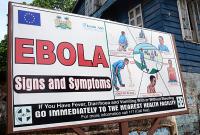 According to the latest predictions of the U.S. Centers for Disease Control and Prevention (CDC), if the Ebola pandemic continues to progress at the current rhythm, it could affect 1.4 million people in Liberia and Sierra Leone between now and January 2015, leading to the deaths of 700,000 in a year, and thus making Ebola the third leading cause of death from infectious diseases in Africa, after AIDS and respiratory diseases.
According to the latest predictions of the U.S. Centers for Disease Control and Prevention (CDC), if the Ebola pandemic continues to progress at the current rhythm, it could affect 1.4 million people in Liberia and Sierra Leone between now and January 2015, leading to the deaths of 700,000 in a year, and thus making Ebola the third leading cause of death from infectious diseases in Africa, after AIDS and respiratory diseases.
Interview with Sam Gindin on 'The Making of Global Capitalism'
Sam Gindin, former Research Director of the Canadian Auto Workers union and co-author with Leo Panitch of “The making of global capitalism” graciously agreed to answer questions from NP board members about his book when he and I participated in a conference at the Center for the Study of Work, Labor, and Democracy at the University of California, Santa Barbara.
The Koch Bros: Libertarians for Daddy
Review of Sons of Wichita: How the Koch Brothers Became America’s Most Powerful and Private Dynasty
By Daniel Schulman
Grand Central Publishing/Hachette Book Group, 2014
Monsters and a Critique of Everyday Neoliberalism:
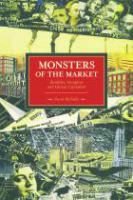 [This is part two of an interview with scholar-activist David McNally on the current economic crisis. The first part focused on the crisis itself, its causes, the way in which working life has been reorganized, the perspective of ruling elites in managing the crisis and pursuing austerity policies, and how this should help inform our stance as movement activists.
[This is part two of an interview with scholar-activist David McNally on the current economic crisis. The first part focused on the crisis itself, its causes, the way in which working life has been reorganized, the perspective of ruling elites in managing the crisis and pursuing austerity policies, and how this should help inform our stance as movement activists.
Argentina: The End of Kirchnerism?
 Scholars have sometimes noted that Argentinian history seems unusually punctuated by periods of booming prosperity followed by dramatic collapse.
Scholars have sometimes noted that Argentinian history seems unusually punctuated by periods of booming prosperity followed by dramatic collapse.
Sleeping Through the Pirate Raid
The mainstream media was never true to its pretension of comforting the afflicted and afflicting the comfortable—which was Gilded Age humorist Finley Peter Dunne’s point—but there were exceptions, and exceptional practices. “Accountability reporting,” or investigative reporting, is one of them.
Rosa Luxemburg: Economics for a New Socialist Project
Right-wing militias killed Rosa Luxemburg and dumped her dead body into the Landwehr Canal after the Spartacus uprising in Berlin. Social democrats and communists finished off her intellectual and political legacy by putting her on their respective pedestals. She became a principal witness against Bolshevik organizing practices for the former and was praised as a co-founder of the German Communist Party and a revolutionary martyr by the latter.
 If the ongoing standoff between the Syriza government and the Troika of
If the ongoing standoff between the Syriza government and the Troika of  For Syriza to triumph, it is not enough for it to play tough with the European Union. not enough to bypass the structure of the European Central Bank to find individual national allies, not enough to refuse to cooperate with capitalist auditors. Greece has already lost 30% of its GDP since the peak before the crisis, with unemployment standing at 25%, a decline only comparable to that seen in the US during the Great Depression.
For Syriza to triumph, it is not enough for it to play tough with the European Union. not enough to bypass the structure of the European Central Bank to find individual national allies, not enough to refuse to cooperate with capitalist auditors. Greece has already lost 30% of its GDP since the peak before the crisis, with unemployment standing at 25%, a decline only comparable to that seen in the US during the Great Depression. 